Perspective | Why isn't Bitcoin a safe-haven asset?
Source: Carbon chain value
Editor: Carbon Chain Value Editorial Department
Is Bitcoin known as "digital gold" in the circle a safe-haven asset? Can we rely on Bitcoin to hedge the risks brought about by the global financial crisis? This is a topic that many people are concerned about recently. The value of the carbon chain was fortunate to invite Zheng Di, CEO of the Dots institutional investor community, Ren Heyi, analyst of the Blockchain Research Institute of Guosheng Securities, and Qin Yuan, a macro solid income analyst of CITIC Construction Investment, to share and answer these questions.
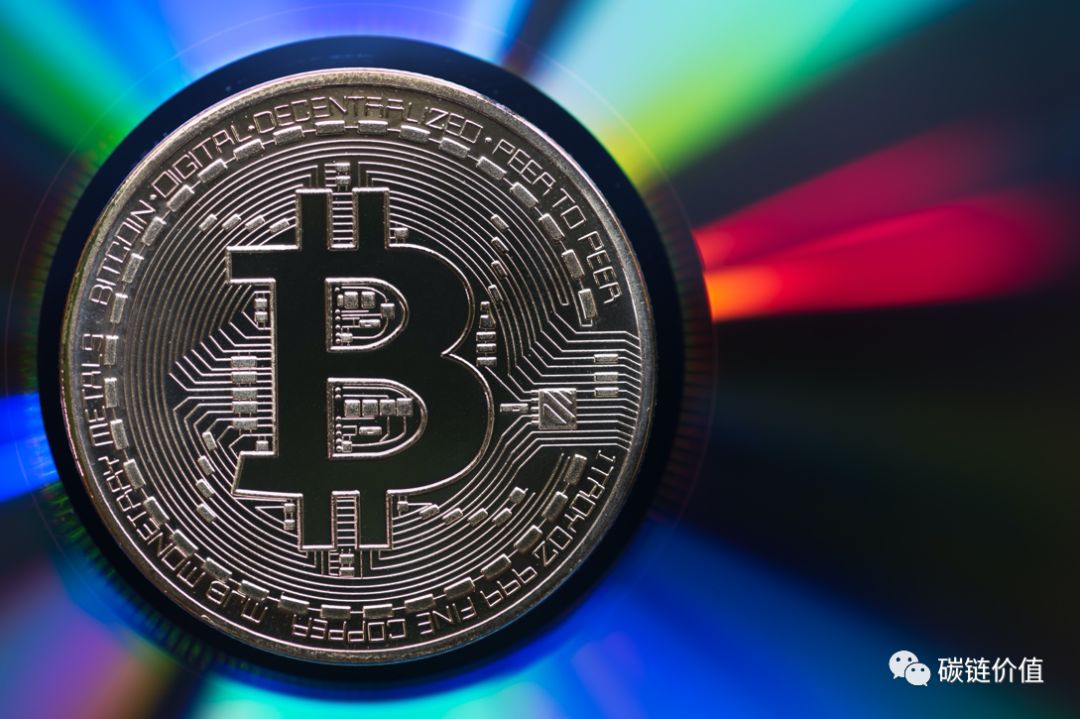
- JPMorgan executives: cryptocurrency hard to appreciate when other assets plummet
- Bitcoin fell more than 10% during the session, and the four major exchanges closed nearly $ 700 million in intraday trading. Is "digital gold" a false proposition?
- Beijing progress in blockchain applications: from "directory blockchain" to the first blockchain electronic invoice
Q1: Since the stock sell-off this week, the correlation between Bitcoin and the S & P 500 has been rising, while the correlation with the price of gold has been declining. Is it appropriate if we continue to call Bitcoin "digital gold"?
Zheng Di: Bitcoin is still relatively new compared to gold and other large assets, and it is only 10 years old. But gold has been around for millennia. If we look at the development history of Bitcoin, we will find that its design concept is actually high imitation gold, but it incorporates some new technology concepts that we later call "blockchain", which guarantees that it is difficult for anyone to counterfeit Bitcoin . But it is not always impossible to forge, it is hard to say, it depends on the development of new technology and the response of Bitcoin. Gold, in fact, everyone thought it was difficult to counterfeit, but now with the advent of tungsten and iridium, more and more fakes are also being made. Conspiracy theorists even doubt that many of the United States' reserves are in this category. Whether in the Hong Kong market or the Mainland market, we have all seen news of this type of fake gold.
So far, in terms of anti-counterfeiting, I personally think that Bitcoin is actually better than gold. To prove that gold is not fake, it also needs very complicated technical equipment and professionals. It is difficult for ordinary people to distinguish authenticity.
However, in terms of asset price changes, we can see that Bitcoin's volatility is still relatively large . Of course, if we compare the time period between 2013 and 2014 into two periods, we will find that Bitcoin's volatility has narrowed significantly. Even so, it is still more volatile than gold. For gold, daily fluctuations of more than 2% are considered to be large fluctuations. This may be because the gold market is now very large. The spot gold market alone has a total market value of 8 trillion US dollars. Products may be as high as 30-40 trillion US dollars (in fact, this number is not accurate). However, the bitcoin spot market actually has a total market value of less than 180 billion U.S. dollars. If you consider losing 3 to 4 million bitcoins, this market value is even smaller. Even if the derivatives market is added, it will not be very large, so a smaller asset class may cause it to be more volatile.
From the perspective of hedging attributes, compared to gold, Bitcoin is still insufficient in terms of hedging attributes. But hedging cannot be generalized, we cannot simply think that anything must be hedging, and what is not hedging. In extreme cases, everything can be sold. There may be some special places in it, such as carry currencies such as the euro and the yen that are borrowed to carry trades. In the real crisis, many assets were sold. When they do, they will go up. So from the perspective of pure hedging properties, I personally think that things like the yen and US Treasury bonds may be better than gold's hedging properties.
Why do you say that? Because gold fell last Friday, we also saw it. My personal opinion is still not a reflection of deflation expectations. I think that there are some problems with market liquidity, so it is likely that some investors in the United States acquired it. Too many index ETFs. Then they are throwing ETFs, and these ETFs may be too late when they clear the market, so they will have to borrow some gold in the market to sell. This is possible, then as liquidity eases, gold should return to its strong space.
Therefore, under normal circumstances, gold does have a better hedging property. But we can also see that when liquidity is exhausted, gold can't actually play a role in real risk aversion. Therefore, such a hedging property is something similar to a mysterious code. We should not be too superstitious, but we must analyze it in detail. In addition, according to official data, global central banks have 33,000 tons of gold, so their gold cannot actually generate interest on their hands, so they tend to rent out the gold, lease it to these Dealers, and then get some income. The most typical is November 2018. We can see that the gold lease reached an all-time high at that time, with an annualized rate of 2.5%, and that part covered a short-term drop in the price of gold.
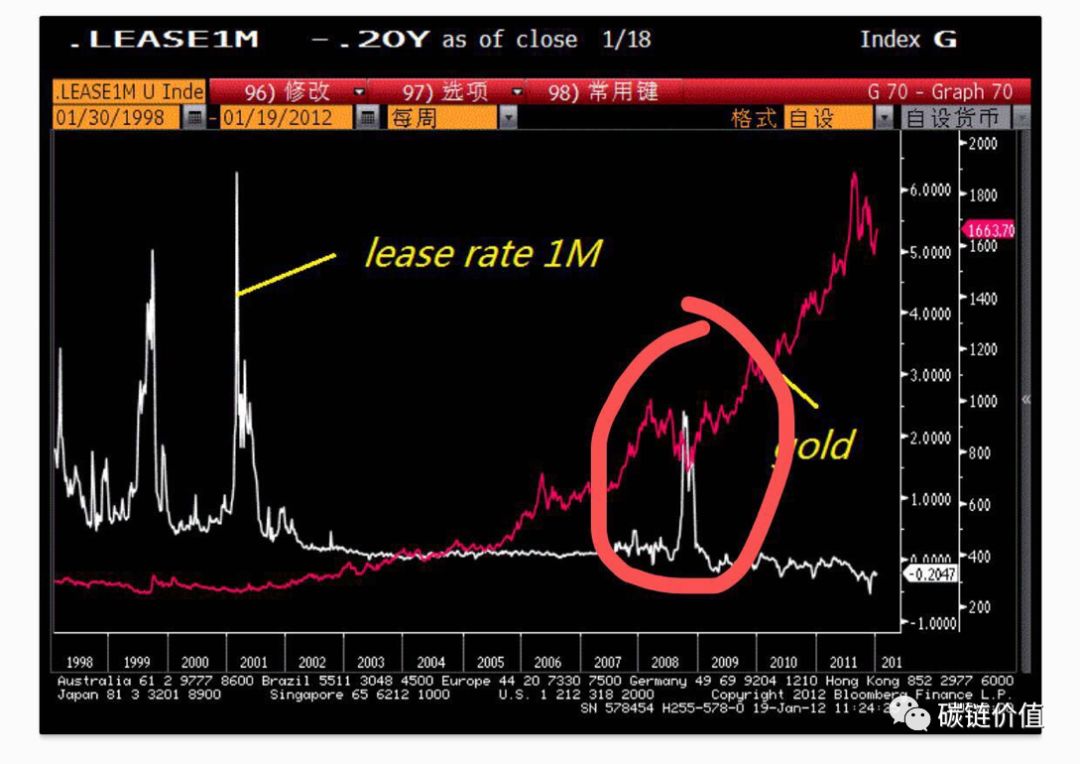
This chart can be seen very clearly, the white line is the gold lease rate, and the red line is the gold price. So in November 2008, some people asked why the price of gold fell first. Because most people in the market faced a marketing call and were forced to borrow gold, the lease tender was very high, and then it was thrown out. When the gold lease rate is relatively peaceful in 2013 and 2014, it is basically 0.1 to 0.2. It is now between 0.5 and 0.6. Therefore, gold, as a means of liquidity, has some erosion and weakening of the hedging attributes.
The safe-haven attributes of gold mentioned above are not absolute, but compared to the safe-haven attributes of bitcoin, we can see how far it has gone. After all, Bitcoin is a new thing, and there are some predators in it, so it may also face a short-term sell-off. Especially some concentrated selling, it is easy to knock down the price of the coin. We still remember that when Bitcoin rose from more than 3,000 to nearly 8000 in the second quarter of last year, a large amount of 5000 or 6,000 Bitcoin suddenly appeared on the BitStamp exchange. Pending orders, the price of bitcoin was raised to about 6,100 US dollars at that time, at that time, the mainstream exchanges were basically between 69,000 and 7000. This is a relatively big problem for Bitcoin at present, and the market depth is far from enough.
Due to the problem of market depth and the problem of whale players, as long as there are large sell orders and large buy orders, the price of Bitcoin can easily fluctuate. For example, as for the mysterious purchase order on April 2, 19, everyone should remember very clearly that 100 million US dollars in the three spot exchanges referenced by the futures exchange Bitmex swept the goods, which suddenly caused the day to rise by 20%, and the insufficient depth caused the bit The currency has skyrocketed, and although it has narrowed a lot, it is still relatively less stable than gold. I personally think that Bitcoin is still not as stable as gold in terms of volatility and hedging properties, so it is understandable that gold now has such a large market value.
But I prefer to think of Bitcoin as walking on the road to digital gold. At present, Bitcoin is the one that has gone the farthest and the most promising on the road to becoming digital gold. Of course, no one knows whether it will become the real digital gold in the future, just that there is hope.
From other aspects, such as the convenience of carrying and the transfer of funds, as well as non-counterfeit, Bitcoin is superior to gold in these aspects, so I think it does have some conditions for becoming digital gold. It's just that its history is relatively short, only ten years, plus the depth of the market, and relatively few players to participate, the real big money has not yet come in. Even the gray level of the so-called "institutional investors" we are seeing is actually only $ 23 billion or $ 3 billion.
What kind of bitcoin may develop, we need to see how high the degree of social recognition of it. Here I would like to cite a survey conducted by Charles Schwab in the United States in the third quarter of last year: The millennials who opened pension accounts at Charles Schwab have allocated 1.84% of the Bitcoin Trust gray GBTC products, and Bitcoin has entered the thousand The top ten positions of the Jubilee Pension Account.
Why is the allocation of millennial pensions important? They are the children of the post-fifties baby boomers in the United States. We all know that the most wealthy people in the United States are the post-fifties baby boomers. They have mastered the right to speak and wealth in American society. I do n’t have specific figures on their wealth transfer, but according to related reports, it may be the largest transfer of heritage in human history, amounting to as much as US $ 62 trillion. Therefore, their children, the millennials, will be the most important group of people to control asset price changes. Therefore, they configured the gray GBTC to the top ten heavy storage industries, accounting for 1.84%, which is undoubtedly a very noteworthy trend.
So from the current situation, I still tend to define Bitcoin as not yet becoming digital gold, but on the road to becoming digital gold, and there is still a long way to go. To become digital gold requires more trust from everyone, especially the mainstream trust, which takes time. I am very convinced that the development of compliance is very important for niche assets such as Bitcoin, because only in this way can mainstream capital continue to come in and expand the market depth. On the other hand, bitcoin is now more liquid-driven due to the slightly insufficient market depth. Therefore, in essence, it can be regarded as a liquid asset, in other words, a risk asset with a high degree of risk and liquidity correlation, rather than a safe-haven asset. From my analysis framework, I pay more attention to the impact of changes in global liquidity expectations on Bitcoin.
In 2018, the new debt king Gangluck observed that Bitcoin is highly correlated with the Nasdaq index, which is understandable. Because the Nasdaq is also liquid-driven, it is normal to have some correlation with Bitcoin.
However, correlation is not causal, nor does it necessarily have a certain logical connection, but it may show this characteristic at a certain period of time. But we can't take correlation as causality, we still have to analyze the cause of correlation every time. Nor can we stick to stereotypes and take relevance as always relevant. In other words, we think that it is a risk asset now, and it will never be a safe-haven asset in the future.
Ren Heyi: Is it appropriate to continue calling Bitcoin digital gold? I do n't think bitcoin can be said to be digital gold at present, but can only say that the circle holds such an expectation. Because I believe that there are definitely many people in the world's 7 billion people who don't know this thing, but basically everyone knows gold-that is to say, although Bitcoin and gold have many similar properties, there is far no consensus like gold. To be precise, "Bitcoin is digital gold" is just the vision of our circle or part of people, hoping to make Bitcoin into digital gold-interestingly, the Fed noted that Powell also said in a congressional defense Too.
We all know that according to Fisher's interest theory, the value of an asset is a discounted future expectation. If digital gold is Bitcoin's long-term vision, then the current price of bitcoin will reflect people's expectations for this vision-obviously not yet reached the point of digital gold.
Qin Yuan: I know bitcoin and digital gold more from the attributes of currency. I think Bitcoin is actually a kind of digital gold.
The most basic value of gold is value storage. First, it can travel through time. It will not change much 1000 years ago and 1000 years later. Second, it will travel through regions. No matter in China or the United States, things will not deteriorate. Third, it will go to some extent. Being able to pass through culture, whether they believe in Christianity or Islam, their understanding and views on gold are basically the same. Bitcoin also basically meets this characteristic, and even behaves more pure in some aspects.
As everyone knows, gold is no longer a currency. There are several reasons for gold's withdrawal from the currency market: the modern state governance system is strong and the fiat currency is pushed; gold itself will bring deflation in the macro; micro may be fake, and ordinary people have certain problems with the recognition of physical gold. Therefore, if real gold is used for currency transactions, the entire transaction cost is still relatively expensive. If Bitcoin can really be popularized in this respect, it may be better than gold's value storage properties to a large extent.
However, as a traditional value store, gold may be a very good asset across cultures, regions, and time from the perspective of various types of assets. So I think gold and bitcoin are basically value storage in my eyes, so I call bitcoin digital gold, and from the perspective of value storage, I have no doubt. This is my share.
Q2: What caused the plunge of Bitcoin and US stocks? With the global stock market plummeting, the signs of central banks' joint rescue efforts are becoming more and more obvious. What effect will this have on the following Bitcoin and US stocks?
Zheng Di: I still hope that Bitcoin and U.S. stocks can be viewed separately, of course, there are still some connections. If you look at the price trend, you will find that Bitcoin's observation of liquidity seems to be ahead of the market. Before everyone realized that liquidity was not as good as they thought, Bitcoin had taken the lead. However, strictly speaking, these two are still separate markets.
Why did Bitcoin fall? In fact, it is very simple. This wave has risen from 7,000 US dollars to more than 10,000 US dollars, at least there is a 30% increase. From the beginning of the year to late February, Bitcoin has risen by 34% and is already the world's best performing large asset. So falling is also normal, after all, it may fall if it rises.
If you want to discuss why it fell from the liquidity framework, I think it's easy to answer. Because of the epidemic situation, everyone did n’t go out at home early this year, and the money was in their own hands, and they did n’t spend it. Therefore, more money was invested in some virtual assets, including the stock market, such as digital currencies. But whether it's the Federal Reserve or the People's Bank of China, it is relatively restrained before this round of decline. Liquidity is not as good as everyone thinks. A typical sign is the size of the Fed's mini QE4, which narrowed before this round of decline. In fact, the People's Bank of China mainly relies on fiscal policy, not expansion of monetary policy.
So after the bulls have raised the price of the currency to 10,000 US dollars, one problem to pay attention to: the liquidity of China and the United States is not as good as market expectations. That's embarrassing. Where is the follow-up? This is the first question. Second question: After pulling it, it will be only one month since the end of February, March 31, Mentougou's announcement day. Considering the potential huge selling pressure, can such a pull disk be sustained?
Obviously, the closer the day to Mentougou, the more limited the increase. I think the adjustment seems to be falling. So the fall is easy to understand.
The decline in US stocks is actually another reason. One is that the epidemic is spreading in the United States, and the other is that the market is worried about Sanders' successful election campaign for the United States President. The Saunders Cup is called "socialism" by the United States. Once he is elected, it will be bad for the capital market.
In general, I think Bitcoin and the stock market are still two separate asset classes, which are still different, each with its own logic. But there is one thing in common: before this wave of decline, liquidity was not as good as expected by the market. The main central banks are still relatively restrained, and the prices have risen a little ahead of schedule. They ran ahead in advance, so now they have to come back to adjust and adapt to the pace of the central bank. Since this wave of central banks will release water again, it is difficult to say how much it will fall. This is my opinion.
Ren Heyi: In fact, US stock market fluctuations are normal. At present, the total market value of US stocks has more than doubled US GDP. During the Trump era, the US dollar returned a lot, because there were not many industrial chains to invest in, and the money went to the stock market wherever it went. The stock market shocks are very likely at this stage. With the spread of the epidemic in the United States and globally, panic in the market has also gradually erupted, which is also a very important reason.
Speaking of Bitcoin's decline, I definitely hope this is a squat before the halving. But from my observation, the bitcoin market capacity and depth are not enough-because in fact there are very few bitcoins that are actually traded on exchanges, and the willingness of miners to store coins is still strong. So its rise or fall is really hard to predict.
The other is the stock market and the bitcoin market. In terms of the degree of capital correlation, I think it is very, very low. I also said earlier that digital gold is just a very good prospective vision of Bitcoin. In fact, the current decline of Bitcoin and the decline of U.S. stocks do not have much correlation.
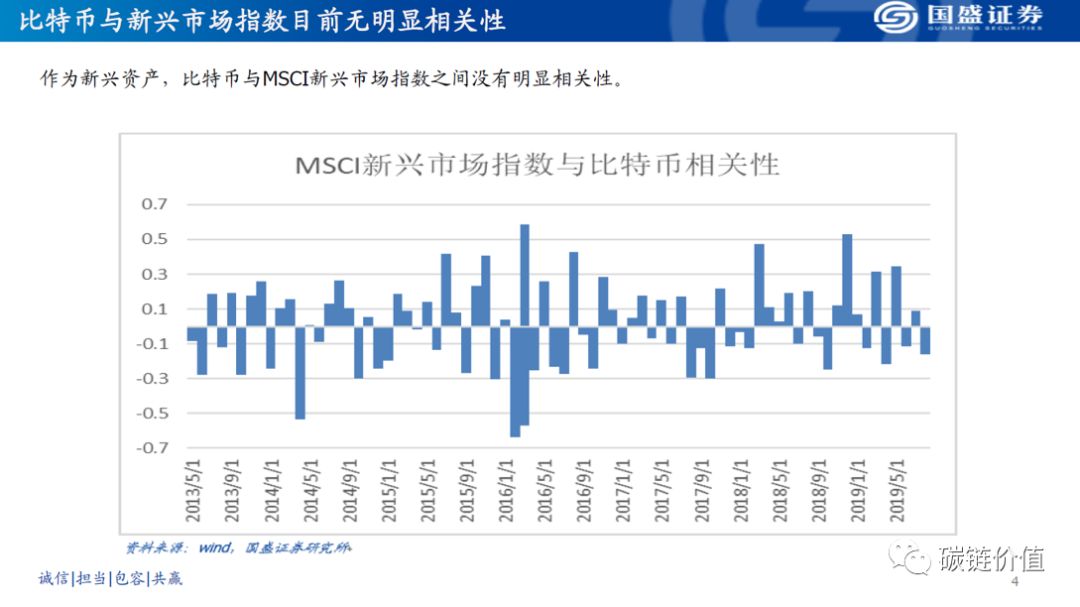
Trump has always hoped that the Federal Reserve can release liquidity to rescue the market. However, the extent to which the rescue can be rescued depends on many aspects. Now that the epidemic is spreading around the world, the US capital market may also need time to digest these expectations, and can only go one step at a time.
As for the impact of global central banks' release of liquidity on Bitcoin, I think it can basically be ignored. Because of the central bank's bailout money, there is no evidence that how much will flow to the bitcoin market, after all, the two are very little related in terms of capital.
Qin Yuan: Bitcoin can be called digital gold, but Bitcoin has only developed for about 10 years. The entire market of Bitcoin is still a very niche, and it is split from many large categories of assets. The analysis of Bitcoin using many of the frameworks for analyzing gold is actually not particularly suitable. As the previous two teachers said, there are indeed major problems with the control of Bitcoin, which is largely a trend of its own.
The recent decline in Bitcoin coincided with the decline in U.S. stocks. This may be a coincidence to some extent, or the linkage between Bitcoin and large-scale assets is gradually strengthened, but from my perspective, it has not been linked to the logic of sustainable allocation of large-scale assets. Or the logic of large-scale asset analysis to analyze the degree of Bitcoin's price trend.
Back to the decline in US stocks, the market has now recognized that one of the main reasons for the decline in US stocks is the epidemic. The second is the recent sudden rise of Sanders. The outbreak of the epidemic may weaken the probability of Trump's re-election to some extent. Sanders's socialist tendency is indeed not particularly friendly to U.S. stocks, which has led to a sharp decline in U.S. stocks . US stocks fell sharply, instinctively thinking that the Fed would come out to help. Since 2018 and 19, the market has basically been this routine. As long as the market is tight, the Fed will inevitably release water.
From the perspective of value storage, releasing water is definitely beneficial to Bitcoin; however, due to the high degree of control, Bitcoin is actually more of its own trend, so it is more difficult to predict.
Q3: During the Sino-U.S. Trade war last year, when Suleimani was assassinated earlier this year, the price of Bitcoin increased significantly. However, this time the global stock market plummeted, and Bitcoin actually experienced the same decline. Is Bitcoin still a safe-haven asset? How should we look at Bitcoin?
Zheng Di: Now that Bitcoin is a relatively niche market, we sometimes associate it with safe-haven assets, but as to whether it is rising for that reason, this is not necessarily the case. For example, when Suleimanni was assassinated, it happened that someone bought it, and it may not be because of this reason. After buying it, it rose, and everyone thought it might be a bit of a hedge. But correlation is not causal, so it is far-fetched after all.
From another perspective, I think that at present bitcoin is more a risky asset, and it is still liquidity-driven, or liquidity expectations-driven. Many bitcoin investment investors in China, and speculators, may not understand or agree with this logic, but we can see that GBTC already has nearly 3 billion US dollars. Its customers are mainly hedge funds. There are some high net worth individuals, etc. These people may recognize these logics. Their movement in and out of the dollar may have some impact on liquidity.
Ren Heyi: I will throw out my core conclusion first: At present, the correlation coefficient between Bitcoin and gold prices is not enough, and there is no obvious correlation between the two.
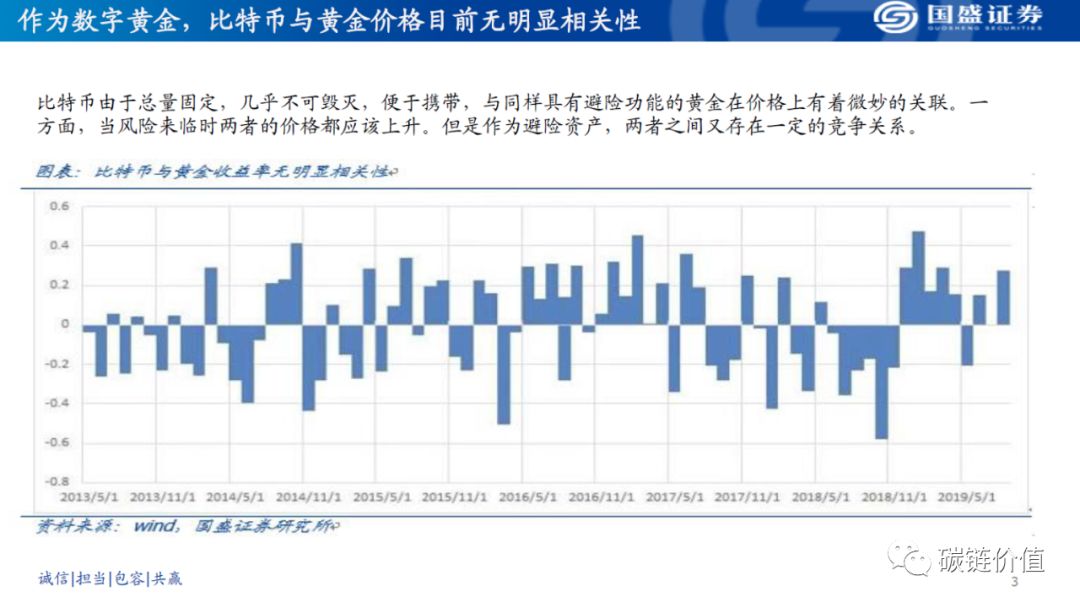
We examine the correlation between the two assets. Rather than putting price curves together to compare trend profiles, this does not conform to statistical laws, but we should look at the correlation coefficient between the two. We previously made a data to examine the price correlation coefficient between bitcoin and gold in the past 7 years. A coefficient close to 1 is a positive correlation, and -1 is a negative correlation. From the data of 13 years to date, the correlation coefficient is expressed as no obvious correlation. Although bitcoin and gold have too many similar properties, its price has no obvious correlation, the correlation coefficient is less than 0.5, and there is no complete rule, which basically fluctuates around zero. I think this is the scientific statistical method to compare the correlation of two assets.
However, last year when the Fed chairman heard it in Congress, he accidentally uttered a sentence: Members asked why Libra did not anchor Bitcoin, and he said that Bitcoin is similar to digital gold. An official said something like this from the mouth of an official. Maybe he personally formed such an understanding, because their research on Bitcoin is closely tracked, so digital gold is an expectation of Bitcoin in the future-part of it. However, there is no obvious correlation between Bitcoin and gold prices, but I think this is where Bitcoin's investment space lies. If you accept that Bitcoin will become digital gold, then Bitcoin should have no correlation with gold now, and there is a lot of room for it in the future. Until there is a clear correlation between the price of bitcoin and the price of gold, it means that the price of bitcoin is affected by gold-or that the investment logic of the two tends to be similar.
The correlation coefficient between the price of Bitcoin and the price of gold is relatively close. The first is that when there is a significant correlation, the investment logic of Bitcoin will be closer to the investment logic of gold, and only safe-haven assets or other logic can be used. Look at Bitcoin. This is obviously not the case at present, so I think if you recognize Bitcoin as the digital gold of the future, then with this beautiful expectation, there is still a lot of room for Bitcoin, and I am personally optimistic.
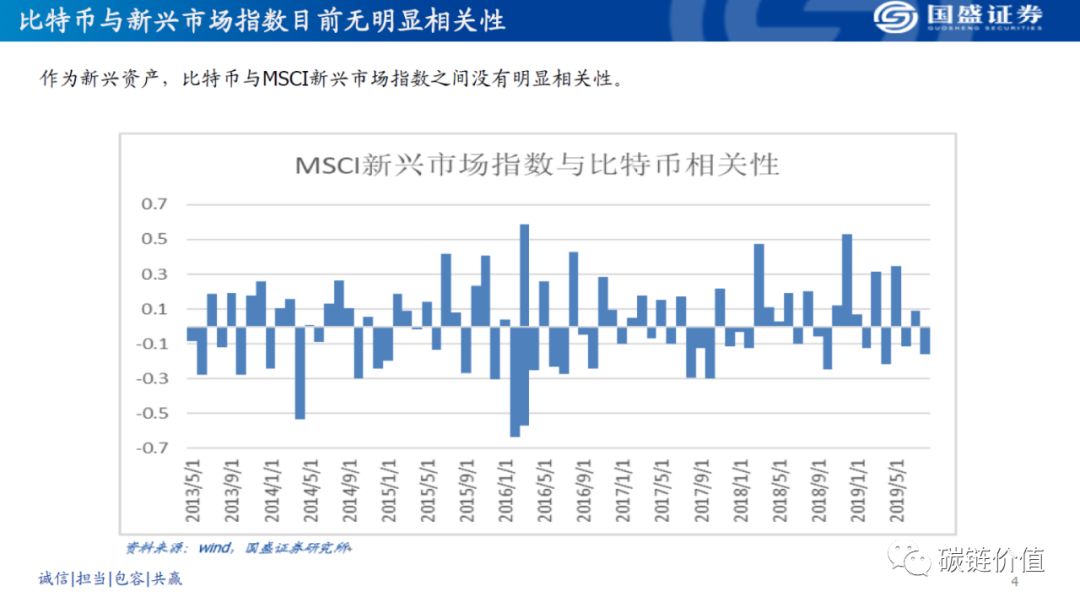
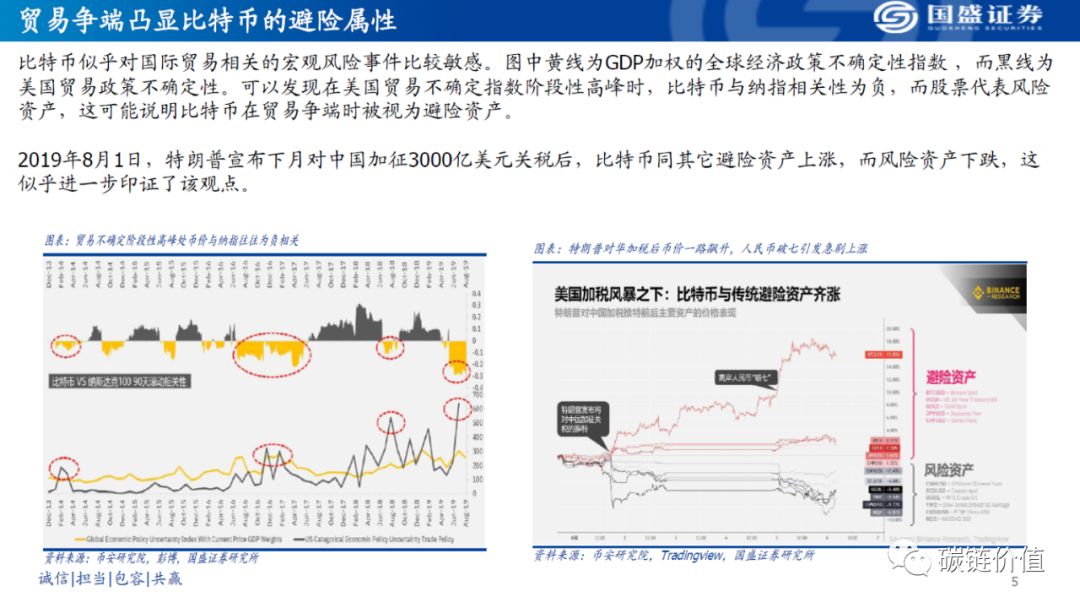
Qin Yuan: The understanding of Bitcoin can be summarized with several keywords. In addition to some of the characteristics I mentioned earlier, Bitcoin is still an emerging market and a niche market. Then, from the perspective of the public, it is actually a market with weak rules. In addition, it is particularly speculative, while the relative volatility of gold is much smaller.
Therefore, from the perspective of microstructure, Bitcoin and gold have great isomorphism or similarity in terms of value storage. However, from the perspective of market performance, the two are basically two completely different at present Market.
In addition, I would like to talk about the value store. In my mind, bitcoin and gold are both value stores, but value storage is not a state without you or without you. Different value stores can coexist.
There are 7 billion people in the world, and some people may have high acceptance of emerging technologies, such as a decentralized chain of digital passwords, and they will easily accept Bitcoin. Bitcoin can easily become a totem in their minds and become a store of value for him. For many ordinary people, they may feel that gold, especially physical gold, is visible and tangible, and after thousands of years of history, they will choose gold as a value store. Therefore, Bitcoin and gold may each have their own group of fans. However, judging from the current market, gold is a relatively stable market. If gold may fall by a few percent or four percent a day, we will feel that this fluctuation is already very large. Then, like Bitcoin, it fell more than ten percent a day, and we are all used to it.
Q4: Every guest teacher thinks, where is the greatest value of Bitcoin? What do you think about the next halving of Bitcoin?
Zheng Di: Young people around the world like to configure bitcoin. In addition to these new gadgets, there is a very important reason is that it does not have a particularly high correlation with other assets. Sometimes it may have a higher correlation with the Nasdaq, and sometimes it may have a higher correlation with gold. But in the long run, it has a low correlation with any kind of asset. This low correlation just constitutes a necessity to configure it, even if it is a small proportion.
In addition, only from the current trend, it is a tool for value storage, but it is relatively more volatile, but if the starting point is relatively low, the safety margin is still relatively relatively, and there are still more than Gold has more upside. After all, bitcoin now has a physical market value of more than 100 billion U.S. dollars, and gold already has 8 trillion U.S. dollars. Therefore, for young people who are willing to take greater risks, seek a certain value store, and seek a certain upside, Bitcoin Coin is a better choice and it is worth configuring some. Although it is now a niche asset, it may become a public asset in the long run.
To be honest, Bitcoin has been halved, I have not been a special cold, and I have never thought that it must be halved to cause it to rise. Many times the rise is related to the monetary policy of the year. The improvement of the supply may have a little effect, but I think the most absolute thing about Bitcoin is not supply, but demand. So I will pay more attention to the expansion or contraction of global liquidity.
In other words, if you believe in halving, but if global monetary policy is contracting this year, it may be miserable, as it was in 18 years.
Ren Heyi: I have just said about the future value of Bitcoin. Digital gold may be the first more realistic application of Bitcoin and a more realistic positioning. But the problem now is that the market capacity and depth of bitcoin is not enough. The funds participating in bitcoin are not very mainstream, and of course they are gradually improving. Futures options, including ETFs, may also be introduced. These traditional capital market tools As a channel, traditional funds can enter the market legally and compliantly. These are good signs.
As an entry point, Bitcoin introduces traditional funds into the blockchain field. I think that the channel will become wider and wider in this future. From this perspective, as a leading variety in the blockchain, there must be a lot of money. Big space.
As for halving, because there have been bull markets in the past two halvings, everyone naturally thinks that there should be a bull market in halving. Actually, this is not the case logically. The halving should reduce the income of miners. If the price does not double, the miners will definitely lose, but it does not mean that the market will double the price in order to keep the miners from losing money.
In the past, the funds entered by the market were relatively marginalized, so it is possible to speculate on a bull market by halving, but whether the halving this time can bring a bull market is certainly unpredictable. Everyone must not simply think that the halving must have a bull market, or you must follow the situation step by step, and this time the price has hit 10,000 times and has not passed three times, which shows that the price of 10,000 is a great pressure.
Qin Yuan: Let me talk about my views on this issue. Regarding the value of Bitcoin, I have repeatedly emphasized that in my opinion it is a value store. The most fundamental value lies in it. With the expansion of blockchain applications, many blockchain applications may be combined with Bitcoin Together. The increase in application scenarios will also increase the recognition of Bitcoin value storage to a certain extent. The other is a problem that we have repeatedly said before. As the public's acceptance of bitcoin increases, the audience of its value store will increase, which may be a very important point for it in the future.
Regarding the issue of halving, if we do not consider other factors, and from the perspective of halving, simply using simple economic analysis means that the supply has decreased. To a certain extent, the price will definitely be boosted. The other is that after halving, it also means that the mining cost will increase. In terms of commodity analysis logic, it is also reasonable to increase costs and prices.
Bitcoin and gold have great similarities at this point. Simple supply and demand is not the most core factor in analyzing its price. The core factor of price is largely the speculative performance of its own market. The above is to find the theme. Well, the previous two halvings have brought bitcoin's bull market, and now everyone has potentially found such a hype theme. But as for whether it can be hyped this time, we must continue to observe.
Q5: Facing the unprecedented market situation this year, please share your investment suggestions.
Zheng Di: Very simple answer, I think Bitcoin still has to seize the opportunity to do more in the future. Of course, we will also adjust the assessment based on real-time changes. My consistent opinion is that if we remove Mentougou, and there are some giant whale selling on the currency price, Bitcoin is currently the best known asset that reflects liquidity. This may be better than gold. It The flexibility is very large. Because bitcoin is a niche asset, it is extremely sensitive to liquidity. If we think that liquidity is better, all countries have to spread money, then the probability is going to rise, but now it may be better for Mentougou and some giant whales. Suppressed.
This year's economic situation is not good, and all countries will sooner or later spend money, so this is good for Bitcoin. It's just that we have to pay attention to some supply-side disturbance factors.
Ren Heyi: Maintain liquidity. This is personal advice.
Qin Yuan: In the short term, I relatively agree with Zheng's point of view. At present, the combination of hard-core technology and currency drainage will still have two main lines in the market, and both main lines of bitcoin can be related. However, from a medium and long-term perspective, we need to pay close attention to the issues of financial regulation and social governance environment to the attitudes of technology giants and blockchains.
We will continue to update Blocking; if you have any questions or suggestions, please contact us!
Was this article helpful?
93 out of 132 found this helpful
Related articles
- Vitalik Buterin: PoS has higher efficiency and security than PoW
- PayPal CTO: The development of cryptocurrencies must focus on consumer demand, and digital currency is inevitable
- Venture capital observation: after the epidemic "test", the development of the blockchain industry can be expected
- DeFi Weekly Selection | DEX scale has increased nearly 4 times in 3 months, and the centralized platform is gradually diminishing?
- Babbitt weekly election 丨 Global crisis triggers bitcoin avalanche, but frequent supervision is good for long-term trends or unchanged
- The currency market and the stock market fell, and the bitcoin that was suddenly sold out was caught up in the "oil war"?
- Starting from the hash function, this article tells you exactly what hash ideas and hash table construction are.




